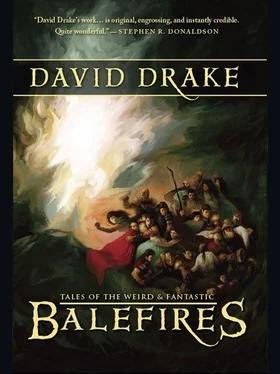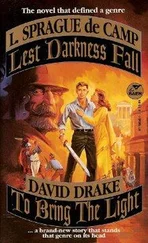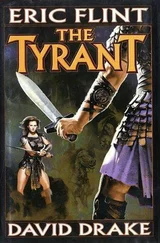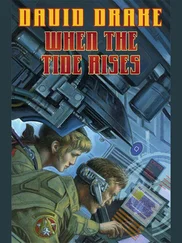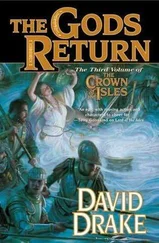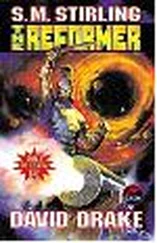David Drake - Balefires
Здесь есть возможность читать онлайн «David Drake - Balefires» весь текст электронной книги совершенно бесплатно (целиком полную версию без сокращений). В некоторых случаях можно слушать аудио, скачать через торрент в формате fb2 и присутствует краткое содержание. Жанр: Фантастика и фэнтези, на английском языке. Описание произведения, (предисловие) а так же отзывы посетителей доступны на портале библиотеки ЛибКат.
- Название:Balefires
- Автор:
- Жанр:
- Год:неизвестен
- ISBN:нет данных
- Рейтинг книги:5 / 5. Голосов: 1
-
Избранное:Добавить в избранное
- Отзывы:
-
Ваша оценка:
- 100
- 1
- 2
- 3
- 4
- 5
Balefires: краткое содержание, описание и аннотация
Предлагаем к чтению аннотацию, описание, краткое содержание или предисловие (зависит от того, что написал сам автор книги «Balefires»). Если вы не нашли необходимую информацию о книге — напишите в комментариях, мы постараемся отыскать её.
Balefires — читать онлайн бесплатно полную книгу (весь текст) целиком
Ниже представлен текст книги, разбитый по страницам. Система сохранения места последней прочитанной страницы, позволяет с удобством читать онлайн бесплатно книгу «Balefires», без необходимости каждый раз заново искать на чём Вы остановились. Поставьте закладку, и сможете в любой момент перейти на страницу, на которой закончили чтение.
Интервал:
Закладка:
The crewmen scrambled to their fifty-ton mount, hulking and rusted and more temperamentally fragile than any but the men responsible for such monsters will ever know. Schaydin's staring eyes followed them as he himself bent at the knees and touched the block of C-4. Its smooth outer wrapper was cool to his fingers. Without looking at the explosive, Schaydin slid it into a side pocket of his fatigue trousers. He walked swiftly back to his tent.
Tropic sunset is as swift as it is brilliant. It crams all the reds and ochres and magentas of the temperate zones into a few minutes which the night then swallows. But the darkness, though it would be sudden, was hours away; and Schaydin's pulsing memory would not let him wait hours.
Sloane was radio watch this afternoon. The driver sat on the tailgate of the command vehicle with his feet on the frame of his cot. He was talking to the staff sergeant who would take over as CQ at 2000 hours. They fell silent when Schaydin appeared.
"Go ahead, Skip, get yourself some supper," the lieutenant said stiffly. "I'll take the radio for a while."
"S'okay, sire, Walsh here spelled me," Sloane said. He pointed at the paper plate with remnants of beef and creamed potatoes, sitting on his footlocker. "Go ahead and eat yourself."
"I said I'd take the radio!"Schaydin snapped. He was trembling, though he did not realize it. Sloane glanced very quickly at his commander, then to the startled sergeant. The driver lowered his feet from the cot and squeezed back so that Schaydin could enter the track. The two enlisted men were whispering together at the open end of the tent when their lieutenant drew the poncho shut, closing off the rest of the world.
It was dim in the solid-walled vehicle, dimmer yet when Schaydin unplugged the desk lamp. Radio dials gleamed and reflected from the formica counter, chinks of light seeped in past the curtain. But it would serve, would serve…
The texture of the C-4 steadied Schaydin's fingers as he molded it. The high sides of the ash tray made it difficult to ignite the pellet. The hot steel of the lighter seared his fingers and he cursed in teary frustration; but just before Schaydin would have had to pull away winked the spark and the orange flare-and in it, the girl dancing.
Her head was flung back, the black, rippling, smoky hair flying out behind her. Schaydin heard the words again, "A Marie! Ici! Viens ici!"The radio was babbling, too, on the command frequency; but whatever it demanded was lost in the roar of the crowd. Passion, as fiercely hot as the explosive that gave it form, flashed from the girl's eyes. "Come to me!"
The flame sputtered out. Schaydin was blind to all but its afterimage.
The compartment was hot and reeking. Sweat beaded at Schaydin's hairline and on his short, black moustache. He stripped the backing away from the rest of the explosive and began to knead the whole chunk, half a pound, into a single ball.
"Battle Six to Battle One-Six," the radio repeated angrily in Col. Brookings' voice. "God dammit, Schaydin, report!"
The ashtray had shattered in the heat. Schaydin swept the fragments nervously to the floor, then set the lump of explosive on the blood-marked formica. A shard of clear glass winked unnoticed in the heel of his hand. He snapped his lighter to flame and it mounted, and she mounted – and she called. Her hands could not reach out for him but her soul did and her Hell-bright eyes. "Viens ici! Viens!"
The dancer's smooth flesh writhed with no cloak but the flame. Higher, the radio dials melting, the lizard-tongue forks of the blaze beading the aluminum roof-Schaydin stood, his ankles close together like hers. He did not reach for her, not because of the heat but because the motion would be-wrong. Instead he put his hands behind his back and crossed his wrists. Outside the curtain, voices snarled but the dragon-hiss of the C-4 would have drowned even a sane man's senses. She twisted, her eyes beckoning, her mouth opening to speak. Schaydin arched, bending his body just so and "Come!"
– and he went.
The poncho tore from Col. Brookings' fingers and a girl plunged out of the fiery radio compartment. She was swarthy but not Vietnamese, naked except for smoldering scraps of a woolen shift. Neither Brookings nor the enlisted men could understand the French she was babbling; but her joy, despite severe burns on her feet and legs, was unmistakable.
No one else was in the vehicle.
On October 14, 1429, the assembled villagers of Briancon, Province of Dauphine, Kingdom of France, roared in wonderment. The witch Mariedela Barthe, being burned alive at the stake, suddenly took the form of a demon with baggy green skin. The change did not aid the witch, however, for the bonds still held. Despite its writhing and unintelligible cries, the demon-shape burned as well in the fire as a girl would have.
Firefight
One of the best of many good things that's happened in the course of my writing career is that I got Kirby McCauley for an agent. (And incidentally, if these intros don't make it clear that I've been amazingly lucky all my life, then they're distorting a truth that I feel all the way to my bones.)
After Mr. Derleth died, I had to look for new markets. I managed to sell a story toF amp;SFbut a lot of short fiction was being published in one-shot anthologies that I wasn't even going to hear about before they closed. I thought about agents, but I didn't really know how to go about getting one and I felt (rightly) that anybody who took me at that stage of my career was a pretty doubtful prospect himself.
A pulp dealer friend, Richard Minter, mentioned that a correspondent from Minneapolis, Kirby McCauley, had started representing fantasy writers. He was agent for a number ofWeird Talespros (Carl Jacobi, for example), but he also had new Arkham House writers like Ramsey Campbell and Brian Lumley in his stable.
Would he represent me? Did I really want an agent? And perhaps most important, how painful would it be to be turned down? Pretty painful, I suspected, but I could delay the event by not writing McCauley.
Two things happened. F amp;SFpublished a Cthulhu Mythos novelette by Brian Lumley. Since the 1950s, the only Lovecraftian stories in the magazine had been parodies-it was far too sophisticated for "pneumatic prose" to quote one editor's comment about Lovecraft's own style. Yet here was an unabashed pastiche. I could only assume that Mr. Lumley's agent was an incredible salesman. (Oddly enough, that was precisely the correct assumption to draw from the event.)
Second, Marvel Comics brought out a digest-sized fantasy magazine, The Haunt of Horror. Much of it was written in-house by comics scripters, but there was also a new story by Ramsey Campbell. Mr. Campbell's agent was obviously on top of things.
Furthermore, I learned thatThe Haunt of Horrorwas being killed after the second issue (which was already at the printers). I'd missed my chance at a sale because I didn't have an agent like Kirby McCauley.
I didn't think I could simply write Kirby (well, Mr. McCauley) and tell him I wanted an agent. I'd just finished a story ("Contact!") that I intended to send to Analog. I sent it to Kirby with my query letter instead.
He wrote back with great enthusiasm (Kirby does everything with great enthusiasm; you can question his judgment sometimes, but never his gusto), saying that he was already aware of my writing and had intended to approach me shortly. He thought the story was great (he sent it on to Analog and got an acceptance by return mail, the fastest I've ever had in my life) and looked forward to a long and profitable association.
We've had that, though it was a lot of years before I made enough money to justify Kirby and his sister Kay keeping me on as a client. Kirby went from success to success, ratcheting clients up by orders of magnitude whether they started from nothing (like Karl Wagner) or from something already impressive (like Stephen King, who became Kirby's client after his early six-figure book deals).
Читать дальшеИнтервал:
Закладка:
Похожие книги на «Balefires»
Представляем Вашему вниманию похожие книги на «Balefires» списком для выбора. Мы отобрали схожую по названию и смыслу литературу в надежде предоставить читателям больше вариантов отыскать новые, интересные, ещё непрочитанные произведения.
Обсуждение, отзывы о книге «Balefires» и просто собственные мнения читателей. Оставьте ваши комментарии, напишите, что Вы думаете о произведении, его смысле или главных героях. Укажите что конкретно понравилось, а что нет, и почему Вы так считаете.
